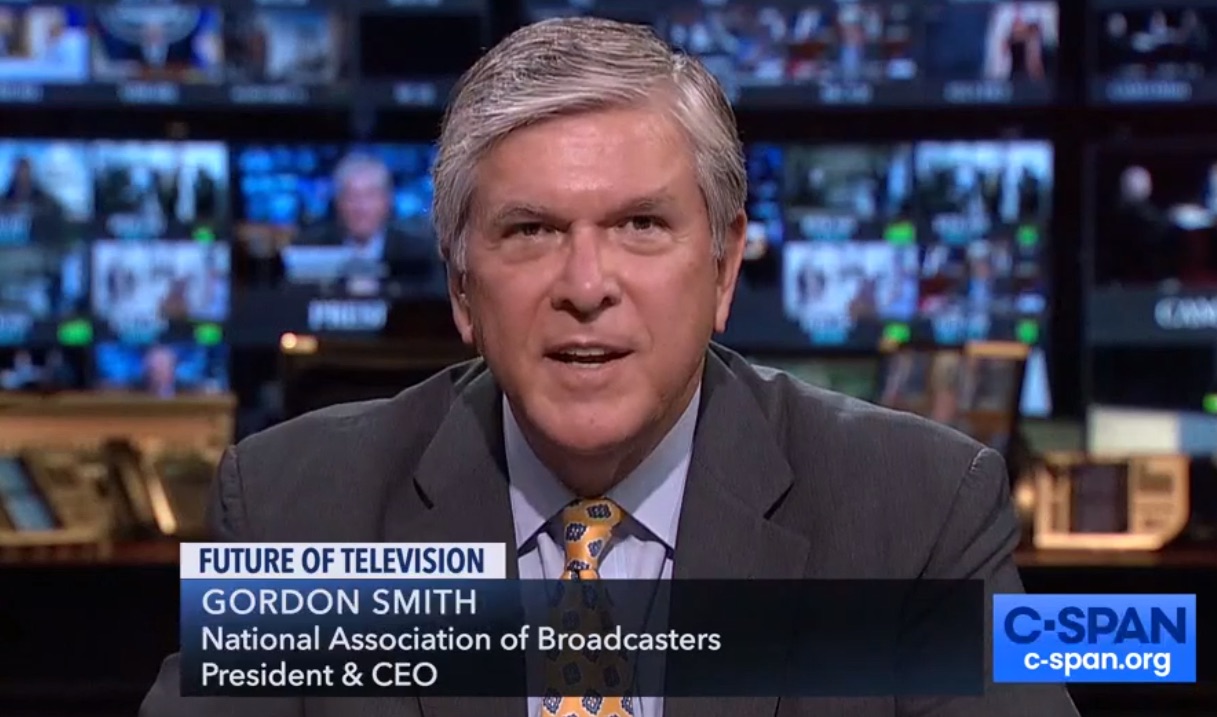NAB's Smith: Broadcasters Want No Service Interruptions During Pandemic

The smarter way to stay on top of broadcasting and cable industry. Sign up below
You are now subscribed
Your newsletter sign-up was successful
NAB president Gordon Smith said broadcasters don't want to see any retransmission consent service disruptions during the coronavirus pandemic.
FCC chairman Ajit Pai has called for a retransmission consent quiet period to avoid TV station signals going off MVPDs.
Smith, who was being interviewed for C-SPAN's Communicators series, said his members are always anxious to get good value for what he called "renting their signals to other outlets" that profit from them and that that sometimes involves tough negotiations. But he said whenever there is a national emergency broadcasters don't want to see any service interruptions and "hopefully our friends on the cable and satellite side will also stand down until we get this behind us and avoid service interruptions if at all possible. That is our history and I have no reason to believe that won't continue."
Related: Pai Calls for Retrans Calm in Coronavirus Storm
Pressed on whether he was committing to no blackout during the pandemic, Smith said he couldn't speak for every member company and their economic interests, but said that "on calls with his executive committee and individual mergers" that they recognize their responsibility "not to have service interruptions during this time." But he also said in the end it does take two, and hoped the MVPDs share that same public spiritedness and give broadcasters fair value and also be attuned to the needs of viewers.
Matt Polka, president of ACA Connects, which represents small and midsized MVPDs, said he is on board with a retrans quite period. "We endorse his [chairman Pai's] call for broadcasters to work with cable and satellite operators to prevent service disruptions during this crisis," said Polka following Pai's call for calm.
The NAB president said that cancelling the NAB Show in Las Vegas was a "great injury" to the association, but a decision it had to make. He called it an "agonizing" decision the economic impact of which he was still calculating. He said it would have been about 100,000 attendees looking at a million square feet of exhibit space. He said NAB would look to replace the show with a digital platform for exhibitor's products, plus an enhanced NAB Show in October in New York.
The smarter way to stay on top of broadcasting and cable industry. Sign up below
But also said that if the virus does dissipate in warmer weather, he hoped to have a "great NAB Show next April."
But Smith also said NAB has been looking at giving exhibitors a year-round online opportunity to show off that tech, which he called a more holistic and modern way to connect in terms of content and technology and communication.
He was asked during an interview about the impact of the coronavirus on broadcasters. Smith, and interviewers Peter Slen from C-SPAN and Jonathan Make from Communications Daily, were all in separate studios to keep social distance.
Smith suggested that another impact of the virus was that Americans are turning to broadcasters in very large numbers because they want the facts, and know they will get them from a local outlet. He said there was a definite increase in viewership as folks stayed at home. He also said it was unfortunate, but that people have become aware of the indispensable role of broadcasting and how valuable it remains during times of national disaster or crisis.
Another impact, he said was that his members were pooling and sharing crews. Something competitors don't usually do, so they can be first informers in a "pooled" fashion when necessary.
Broadcasters are also participating in, and producing, multiple public service campaigns about dealing with the virus. Smith said they wanted to make sure the information was constructive and informative and not just frightening.
The broadcast spokesmen did not have much good to say about social media, arguing that these days it was where people went to get "fake news, half truths, false witness, rumors, slanders, distortions and outright lies" that seem to spread faster than the coronavirus.
He said social media platforms need to start coordinating with traditional news outlets like broadcasting and newspapers so they can get the facts, not spin, from real journalists like broadcasters and "up the integrity of their platform."
He put in a plug for a bill that would allow news outlets to jointly negotiate with online platforms for compensation when those traditional news outlets have stories aggregated online. He said it was important to find "market ways" to support good journalism.
The Smith episode of Communicators will air Saturday, March 21, at 6:30 p.m. ET and Monday, March 23, on C-SPAN2 at 8 a.m. and 8 p.m.
Contributing editor John Eggerton has been an editor and/or writer on media regulation, legislation and policy for over four decades, including covering the FCC, FTC, Congress, the major media trade associations, and the federal courts. In addition to Multichannel News and Broadcasting + Cable, his work has appeared in Radio World, TV Technology, TV Fax, This Week in Consumer Electronics, Variety and the Encyclopedia Britannica.

